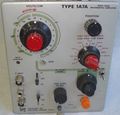1A7: Difference between revisions
(template, cat) |
No edit summary |
||
| Line 23: | Line 23: | ||
heater voltages on the 7586's. | heater voltages on the 7586's. | ||
Type 1A7 was [[introduced in 1966]]. In 1968 it was superseded by | Type 1A7 was designed by [[John Addis]] and [[introduced in 1966]]. | ||
the FET-equipped '''Type 1A7A''', which also doubled the bandwidth | In 1968 it was superseded by the FET-equipped '''Type 1A7A''' (designed by [[Thor Hallen]]), | ||
and the common-mode rejection. Type 1A7A remained available | which also doubled the bandwidth and the common-mode rejection. | ||
until the end of the [[500-series scopes|500-series]] line after 1974. | Type 1A7A remained available until the end of the [[500-series scopes|500-series]] line after 1974. | ||
==Specifications== | ==Specifications== | ||
Revision as of 22:30, 19 December 2015
Template:Plugin Sidebar 2 The Tektronix Type 1A7 is a high-sensitivity differential plug-in for 500-series scopes. It senses down to 10 μV/Div, either AC or DC-coupled. It's possible to apply up to ± 300 mV offset to the reading while maintaining sensitivity. Upper and lower cutoff frequency is selectable on the front panel. Maximum bandwidth is 500 kHz, and common-mode rejection is 50,000 to 1.
Type 1A7's front end is a matched quad of 7586 nuvistors, with two in parallel - to reduce noise - on each input. These tubes are in temperature-equalizing housings, and mounted on a rubber-isolated subchassis. The "coarse" balance adjustment controls the relative heater voltages on the 7586's.
Type 1A7 was designed by John Addis and introduced in 1966. In 1968 it was superseded by the FET-equipped Type 1A7A (designed by Thor Hallen), which also doubled the bandwidth and the common-mode rejection. Type 1A7A remained available until the end of the 500-series line after 1974.
Specifications
please add
Pictures
-
1A7A
-
1A7A
-
1A7A
-
1A7A
-
1A7A
-
1A7A





